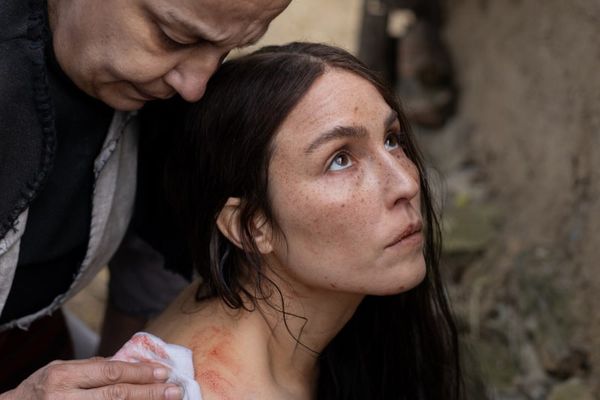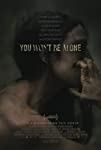Eye For Film >> Movies >> You Won't Be Alone (2022) Film Review
You Won't Be Alone
Reviewed by: Jennie Kermode

Deep in a cave in Macedonia, a girl grows up, from infancy to adolescence, isolated except for brief visits by her mother. She’s being kept there for her own protection. Her mother has made a deal with the ‘wolf eatress’, or witch, who wanted to take her as a baby – has begged instead for permission to raise her and give her to the witch as a servant when she turns 16. The mother hopes to trick the witch, secluding the girl in this inaccessible, holy place, but she doesn’t truly understand the nature of the witch’s powers. When the girl finally stumbles out into the strangeness of the world for the first time, led by the witch in her mother’s skin, she is made into an apprentice, taught the dark magic which will enable her to shapeshift. Her desires are very different from those of her mentor, however, and in due course they will find themselves at odds.
Goran Stolevski’s astonishing début film is narrated in a poetic stream of consciousness by Sara Klimoska, who plays Nevena, the girl. The ways in which she discovers and observes ordinary details in her surroundings gives it a magical quality which goes far beyond its fairy tale premise. It presents a radically different cinematic language, childlike, initially amoral, lyrical. The first witch, Old Maid Maria (Anamaria Marinca, whom viewers may remember from 4 Months, 3 Weeks and 2 Days), is ostensibly stranger, an outcast whose face and body are horrifically scarred as a result of past tortures which have also made an impression on her personality, but it is Nevena, in her innocence, who represents something completely new and raw.

Her journey begins in earnest when she accidentally kills a peasant woman (Noomi Rapace) and, on impulse, shifts into her form. Through this she discovers what it means to be an abused wife living within a circle of women who struggle to get by yet strive to support one another. She cannot speak, the witch having stolen her voice in infancy, but finds it easy to merge into this community nonetheless. The violence she experiences is distressing yet is observed almost without emotion – simply another curious aspect of human life. It does not daunt her, nor destroy her essential optimism. When she leaves this body it will not be simply because she can no longer bear it, but because she is ready to try something else.
By way of Nevena’s passage through different bodies (five actors share the role, achieving remarkable consistency), Stolevski sets out to explore what it means to be human. Each new skin offers something unique, a discovery of new freedoms and possibilities, sometimes accompanied by heartbreak as Nevena begins to realise the wrongness of what has happened to her in the past. Age and gender are nothing more than skins. When she eventually falls in love, she will contemplate what it means to feel something as all of her selves.
All the while, Old Maid Maria, who is sometimes whispered about by the fireside at night, her own tragic story gradually unfurling, watches her. We never know for certain where she is – she could be wearing her own skin, standing on the edge of the forest, or could be inside any human or animal. Occasionally the two meet and converse. Urging a defensive, cynical approach, Old Maid Maria is confounded by Nevena’s ability to keep on approaching the world with tenderness even after bad things happen to her. “Why is it so easy for you?” she asks in a heartbreaking moment which speaks to her own hidden longings.
There is a great deal here about the experience of trauma, how it shapes us and how we might try to shape ourselves. About how personhood is frequently defined from the outside rather than expressing itself as a manifestation of internal experience. The mythic framework was created out of whole cloth but successfully engages with something primal. The ease with which the witches can, if they choose, predate on others is chilling, yet in time it becomes easier and easier to relate to their particular otherness, even as Nevena becomes something closer to human. Is it their supernatural status which makes them different, or are they simply responding to circumstance? Does human society create the monsters it fears?
The film is beautifully shot, making the most of sunny days in the Serbian countryside, giving everything the glow of fresh, unfiltered experience. It’s full of commonplace cruelties and simple joys, a rare reflection of peasant experience. Nobody here is literate; there is little contact with the outside world. Nevena’s awakening is rooted in something deeper. This film signals the arrival of a remarkable new talent.
Reviewed on: 20 Oct 2022
















